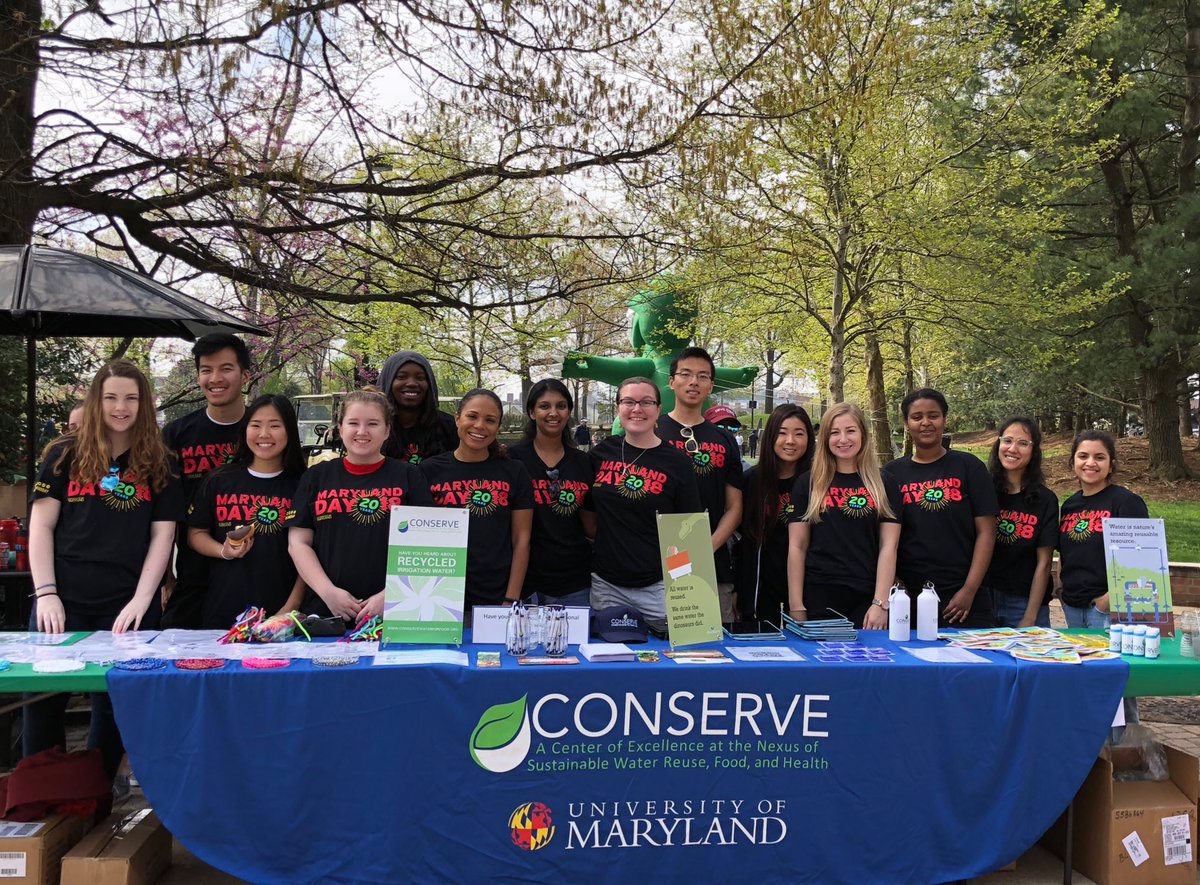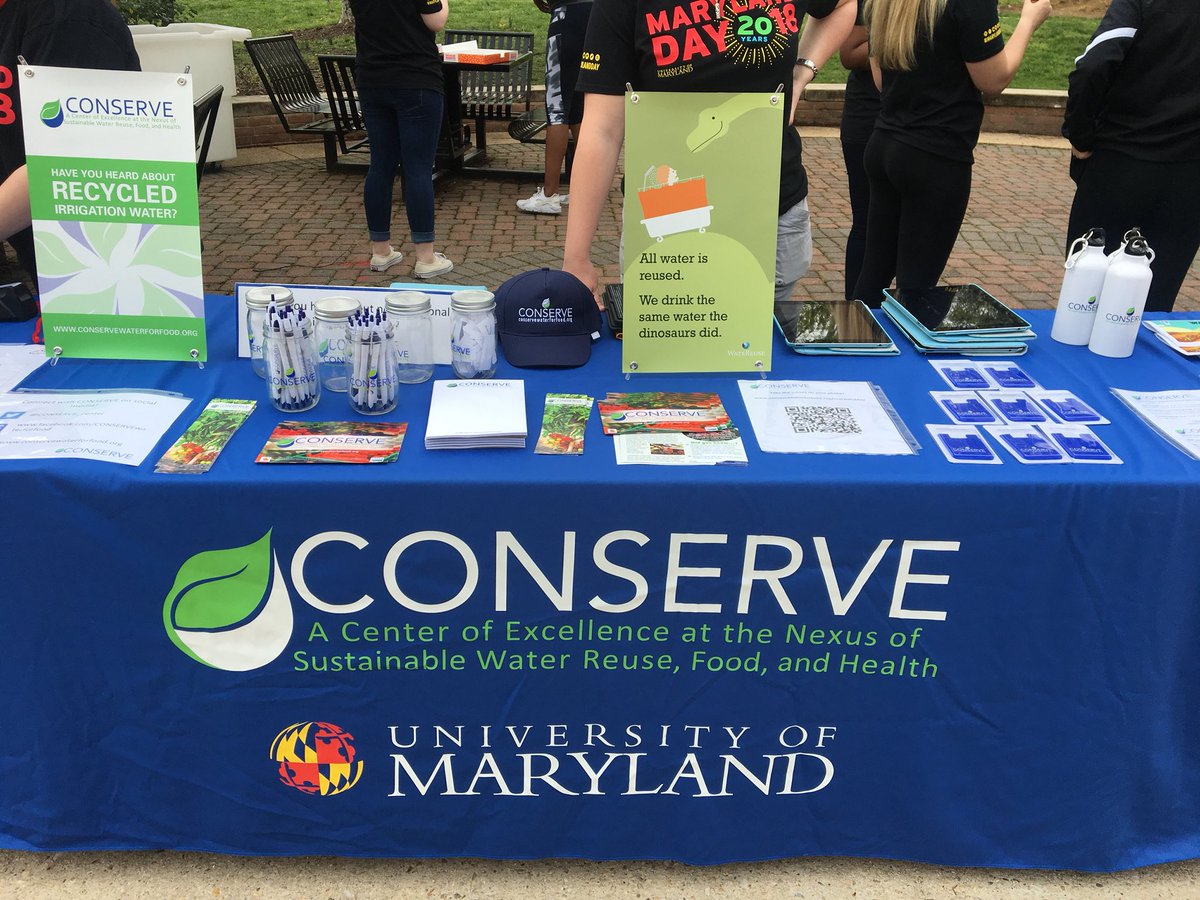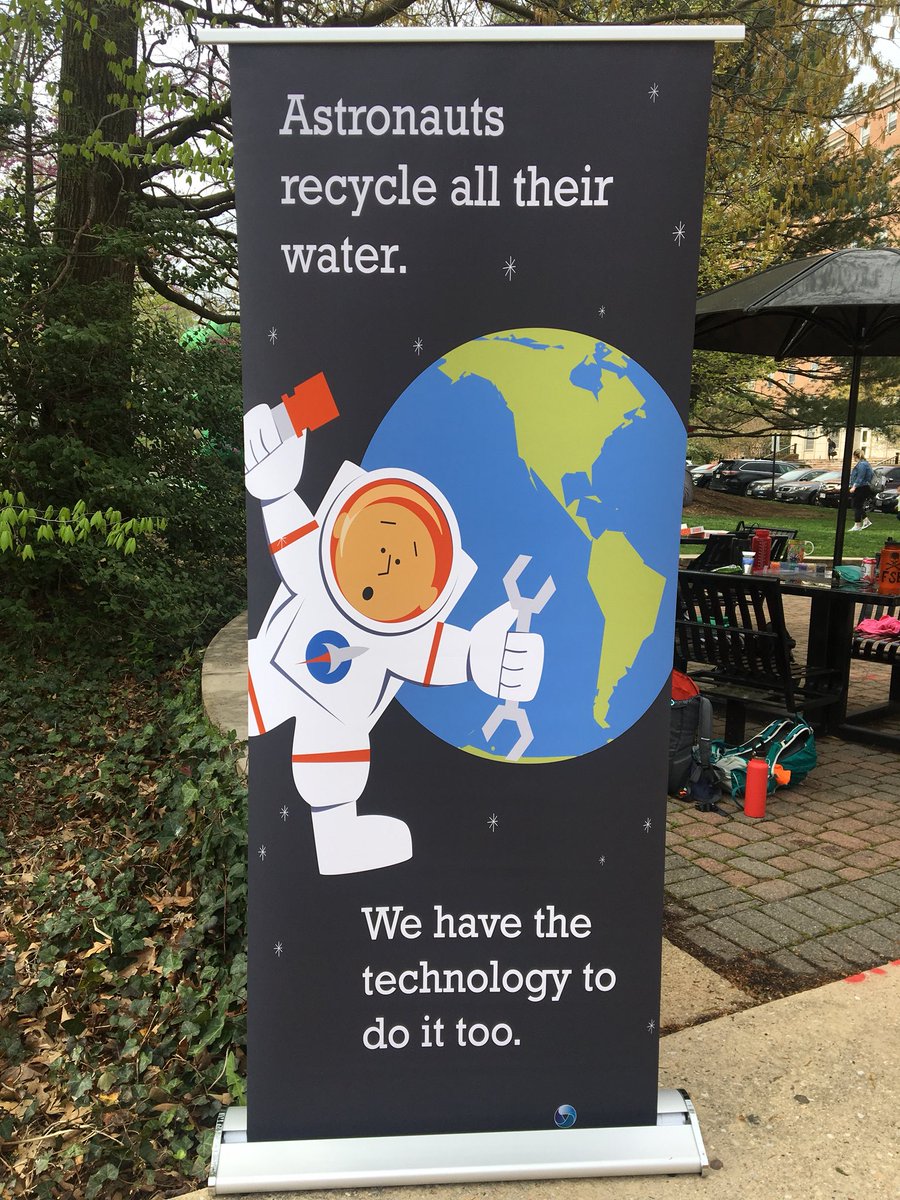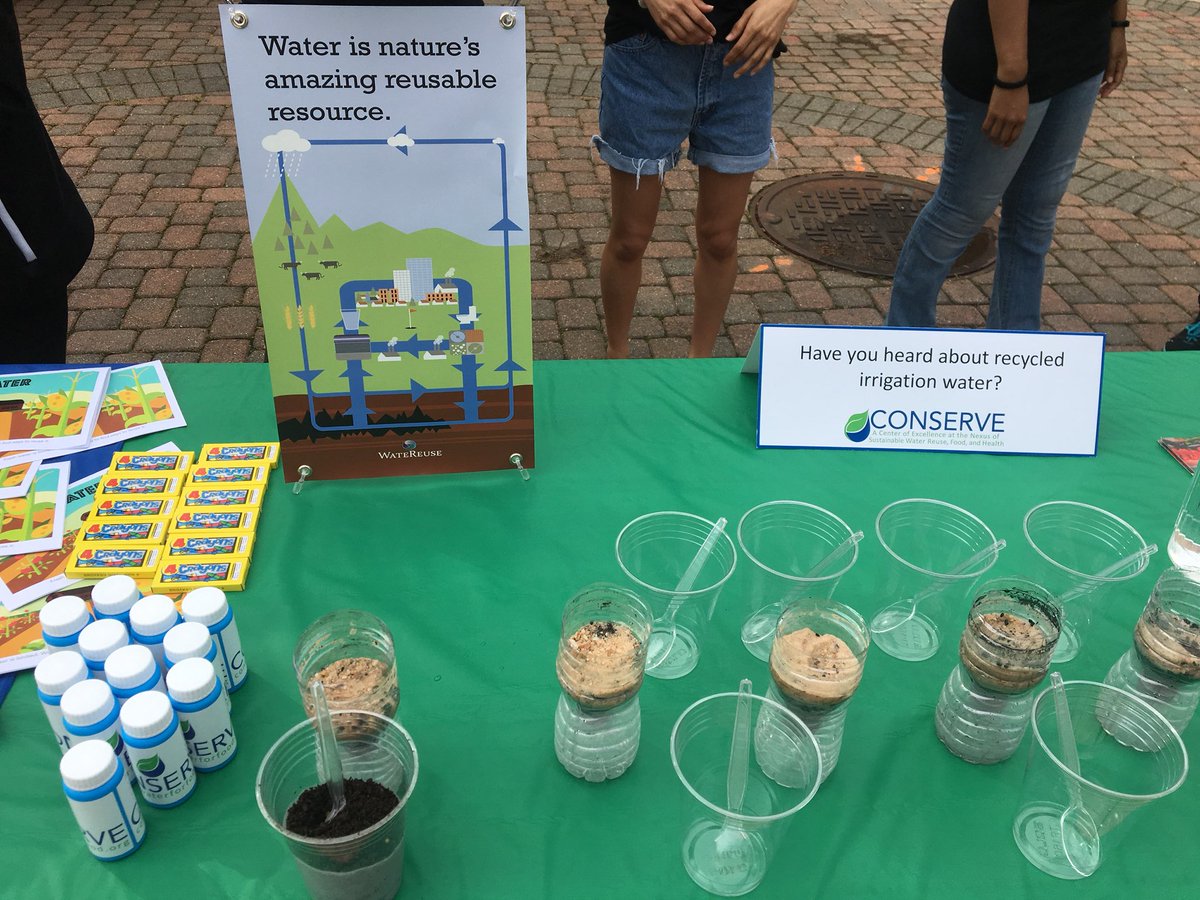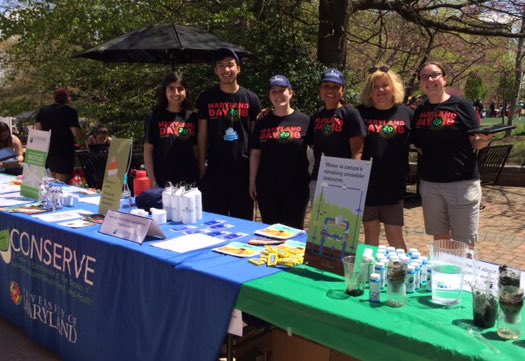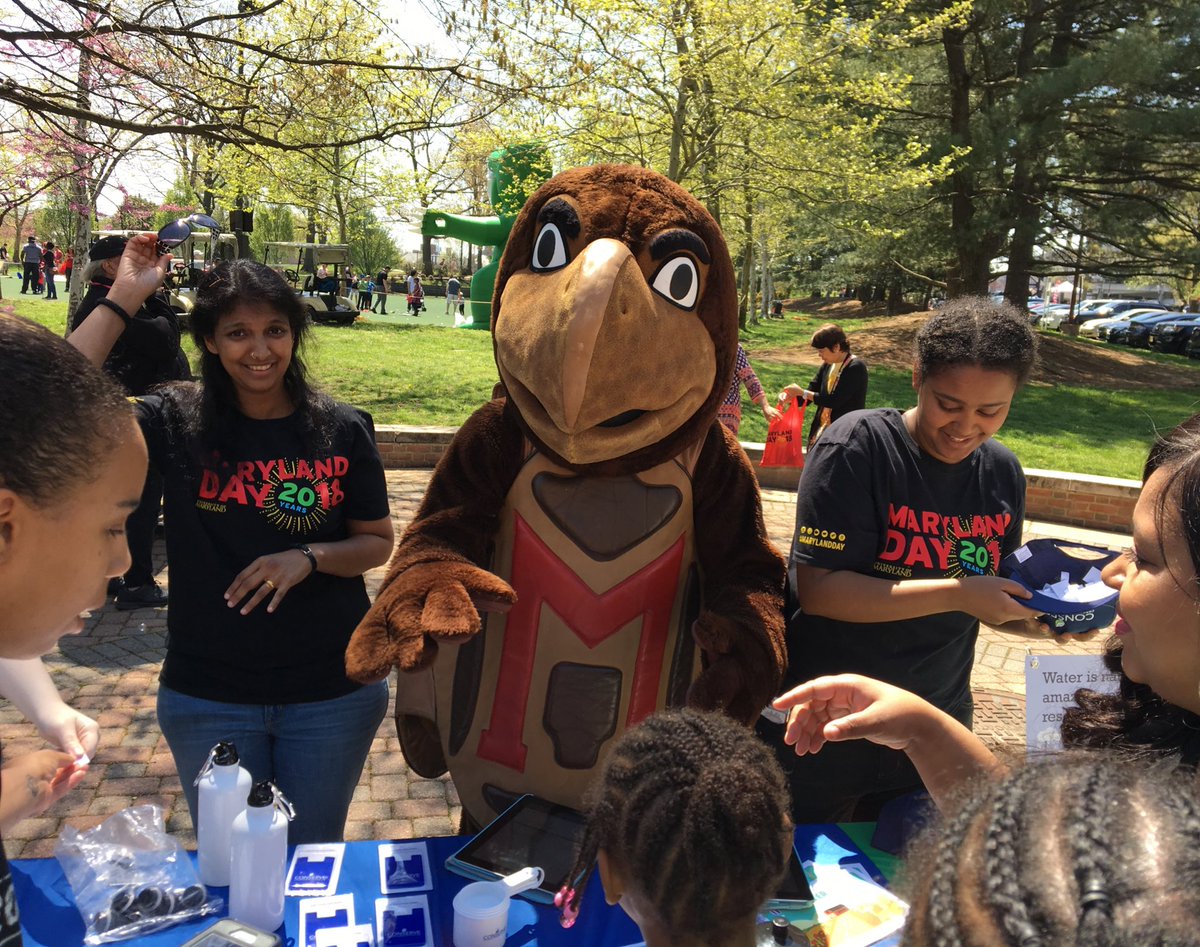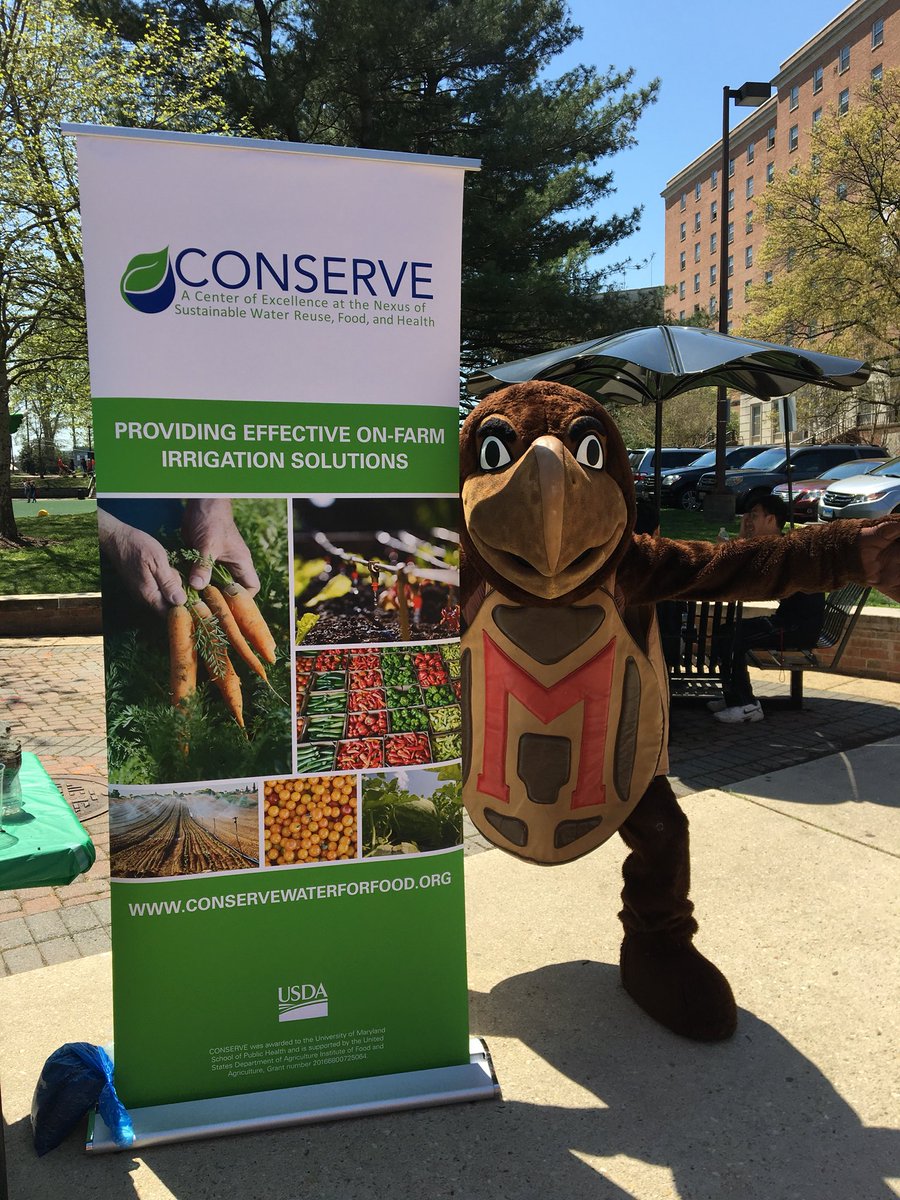Team CONSERVE at Maryland Day 2019!
On a beautiful (but windy) April 27, CONSERVE Scholars highlighted CONSERVE research education and extension at the annual Maryland Day. This year, the CONSERVE team joined together with the new UMD Global STEWARDS (global stewards.umd.edu) to engage visitors in water filtration experiments, a food waste calculator, and other fun activities.
CONSERVE Scholars learn about food, energy, and water systems in Israel & the West Bank
In January 2019, a group of 9 interdisciplinary scholars from the University of Maryland College Park and Baltimore campuses and the University of Arizona embarked on a journey of learning and cross-cultural exchange. Co-led by Dr. Sarah Allard, Assistant Program Manager for CONSERVE (http://conservewaterforfood.org/), Bill Piermattei, Managing Director for UMB’s Environmental Law program, and Dr. Clive Lipchin, a CONSERVE Collaborator, the group traveled throughout Israel and the West Bank, where they studied the region’s diverse approaches to water reuse for agriculture. The tour took them from Tel Aviv to Jerusalem to Palestinian villages in the West Bank to a Kibbutz and a Bedouin community in the Negev desert. Along the way, the scholars encountered the many challenges agricultural communities face as well as successful projects managing a limited and precious resource: water. Post by Dr. Sarah Allard
October 8-9, 2018, Global Water Reuse, Food and Health Workshop
Israel leads the world in agricultural water reuse and has been successfully using recycled water for irrigation of food crops for more than 30 years. Since Israel has a severely limited supply of both water and arable land, it has developed innovative agricultural methods and technologies, such as combining the use of recycled water with drip irrigation and intensive greenhouse agriculture. As a result, the agricultural output of Israel has flourished, effectively solving one of the world’s most dramatic regional water crises.
The October 8-9, 2018 Global Water Reuse, Food and Health Workshop, funded by a grant from the US-Israel Binational Agricultural Research and Development Fund (BARD), aimed to encourage and promote a binational, interdisciplinary scientific network focused on the global urgency to enable safe water reuse for food crop irrigation worldwide, providing science- and technology-based solutions to advance agriculture and protect public health. At the Global Water Reuse, Food and Health Workshop, attendees collaborated to define directions and opportunities for actionable science that establishes new, sustainable on-farm water treatment solutions and production technologies that enable farmers to safely reuse water for the successful irrigation and growth of food crops that are safe to eat. Participants from around the world agreed that the workshop: 1) promoted increased contact between Israeli and U.S. scientists who work in academic, agricultural and industrial settings across all perspectives along the water-soil-plant-human continuum (“farm-to-fork”); and 2) included the participation of graduate students and early career researchers in research lightning rounds. The U.S. and Israeli organizers of this workshop, Dr. Amy R. Sapkota (University of Maryland), Dr. Yael Mishael (Hebrew University of Jerusalem), Dr. Erick Bandala (Desert Research Institute, Nevada), and Dr. Clive Lipchin (Arava Institute for Environmental Studies, Israel), have collaborations in agricultural water reuse. Moreover, several of the other speakers have begun to engage in binational research efforts. Bringing together, in-person, a diverse, interdisciplinary, binational group of scientists, engaged in all perspectives relating to successful water reuse for food crop irrigation, is key to fostering future team science and systems-based approaches that can ultimately support local-to-global solutions.
Team CONSERVE at Maryland Day 2018!
The CONSERVE team had a table at Maryland Day 2018 held at the University of Maryland campus on April 28th. We conducted surveys on consumer perceptions of food safety, made bead bracelets with kids to learn about the water cycle, had a cool water filtration experiment and gave out tons of awesome CONSERVE swag. We even had some help from Testudo! Thanks to all our hard-working volunteers who made the day a success.
CONSERVE Co-PD at The University of Arizona receives USDA NIFA grant
Dr. Sadhana Ravishankar, CONSERVE Co-Project Director at The University of Arizona, is part of a team of seven institutions that received a grant from U.S. Department of Agriculture NIFA to produce safer melons that do not harbor harmful bacteria while also improving smell and taste of the fruit. Congrats to Dr. Ravishankar her team!
Sadhana Ravishankar, left, looks at biofilms displayed by Aishwarya Rao, a research analyst, at the University of Arizona.
UMD School of Public Health Seminar, April 11, 2018, 2-3 PM EST
UMD School of Public Health Seminar, April 11, 2018, 2-3 PM EST
Prof. Benny Chefetz (Dean of the Robert H. Smith Faculty of Agriculture, Food, and the Environment, Hebrew University of Jerusalem)
Title: Irrigation with Reclaimed Wastewater: New Source of Water or Emerging problem?
Location: Room 2236 in the School of Public Health
JOIN WEBEXMEETING https://umd.webex.com/umd/j.php?MTID=me42f9ffb184d7c880cfec1fc65479b9b
Meeting number (access code): 736 359 925 Host key: 937691
Meeting password: Sp3fbQ44
JOIN BY PHONE +1-415-655-0002
Synopsis:Fresh water scarcity has led to increased use of treated wastewater as an alternative source for crop irrigation. Concerns have been raised regarding pharmaceutical exposure via treated wastewater. In our recent work, we demonstrated that active pharmaceuticals are introduced to arable land via irrigation water. Moreover, we showed that some pharmaceuticals can be taken up and accumulated in edible parts of plants. Our studies aimed to assess whether carbamazepine, an anticonvulsant drug highly persistent in wastewater, is present in commercially available treated wastewater-irrigated produce, and whether human exposure to carbamazepine occurs via ingestion of this produce. In this study we follow the exposure path: wastewater Þirrigation water Þ soil Þ crops Þ consumers. Using volunteer cohorts in a single blind crossover trial, carbamazepine and metabolite levels were measured in produce and human urine. Our findings indicated that following seven days of consuming treated wastewater irrigated-produce all volunteers exhibited quantifiable levels of carbamazepine, while in a cohort of volunteers who consumed fresh water irrigated-produce, the distribution remained unchanged from baseline (between group P<0.001). Urine levels of the cohort that consumed consuming treated wastewater irrigated-produce for seven days were found to return to baseline following the exposure periods. This study demonstrates "proof of concept" that human exposure to pharmaceuticals occurs through ingestion of commercially available treated wastewater-irrigated produce, providing data that could guide policy and risk assessments.
CONSERVE announces our first feature animation: "Water, Food, and Our World"
Less than 1% of the world's water is fresh water that we can easily use. To help farmers produce food for growing populations, scientists are working on new techniques for water reuse and exploring nontraditional irrigation water sources.
A Special Thanks to:
New Mexico State University (NMSU) Learning Games Lab Consultants
CONSERVE Design Summit participants
Copyright 2018 New Mexico State University. CONSERVE was awarded to the University of Maryland School of Public Health and is supported by the United States Department of Agriculture-National Institute of Food and Agriculture, Grant number 20166800725064. NMSU and the University of Maryland are equal opportunity/affirmative action employers.
converse with CONSERVE - CONSERVE TURNS 2!
Some of the CONSERVE Mid-Atlantic team members
It's March 1, 2018, marking the start of Year 3 for CONSERVE: A Center of Excellence at the Nexus of Sustainable Water Reuse, Food, and Health (funded by the United States Department of Agriculture-National Institute of Food and Agriculture). CONSERVE's ongoing research, education, and extension efforts support our goal of facilitating the adoption of transformative on-farm treatment solutions that enable the safe use of nontraditional irrigation water on food crops, effectively reducing the nation’s agricultural water challenges that are exacerbated by climate change.
To date, the progress and accomplishments of the CONSERVE team have been remarkable. To list just a few of the many Year 2 accomplishments:
2,313 wastewater discharging facilities were mapped on our GIS platform that focuses on characterizing the availability of nontraditional irrigation water sources in Arizona, California, Delaware and Maryland.
1,812 individual nontraditional irrigation water samples were collected in the Mid-Atlantic and Southwest and tested for all CONSERVE microbiological, physical and chemical water quality parameters including: pH; oxidation reduction potential; turbidity; conductivity; temperature; dissolved oxygen; salinity; nitrate nitrogen; chloride; antimicrobials; caffeine; pesticides; total bacterial diversity; indicator bacteria; and bacterial, viral and protozoa pathogens. All water samples were managed by the Data Core’s state-of-the-art Laboratory Information Management System (LIMS) that was custom-designed for CONSERVE.
> 900 participants participated in 4 economics experiments examining consumer preferences for food grown with traditional vs. nontraditional irrigation water sources
802 growers completed our needs assessment that was administered throughout the Mid-Atlantic and Southwest. This work will help address an important knowledge gap regarding farmers’ views and concerns relating to nontraditional water used to irrigate food crops eaten raw.
17 regional conferences were attended by the CONSERVE Extension team to disseminate CONSERVE material and engage with key stakeholders
2 animations and 1 online video tool are in development to expose K-12 students and the public to concepts relating to agricultural water reuse--stay tuned for the upcoming release of Water, Food, and Our World.
7 undergraduate students participated in the CONSERVE Summer Internship Program with CONSERVE teams around the country. A primary goal of the program is to support Science, Technology, Engineering and Math (STEM) training among students from underrepresented minority groups and/or disadvantaged backgrounds
24 CONSERVE Scholars participated in a data management workshop at SESYNC (A National Socio-environmental Synthesis Center funded by the National Science Foundation), where scholars were introduced to collaborative workflows for managing data in team research projects, the use of R as an open-source software for data management and analysis, and the concept of open data
All 14 CONSERVE Co-PDs and 5 collaborators responded to an evaluation survey, focused on assessing CONSERVE’s organizational effectiveness. These data will be used to refine CONSERVE team processes, and ensure success and sustainability. Among the many strengths noted by the team included “What we are trying to accomplish with our collaborative project would be difficult for any single organization to accomplish by itself”
CONSERVE "Core-dinating" with core facilities to maximize cost-effectiveness, and reduce redundancies.
Three state-of-the-art, centralized cores serve as the bedrock of CONSERVE: the Laboratory Core (Lead: Amir Sapkota), Data Management and Analysis Core (Lead: Mihai Pop), and Administrative Core (Lead: Debra Weinstein). These three cores, all based at the University of Maryland, College Park, interface with all of the CONSERVE Activity Teams to streamline efforts as well as maintain the rigorous approaches that substantiate CONSERVE data.
The cutting edge capabilities of the Cores are described below:
Laboratory Core
The ability to reliably identify and measure trace-level antibiotics, pesticides, and other environmental contaminants in water has important societal benefits. To maximize coordination and cost-effectiveness with regard to the lab methods that require in-depth analyses and are prone to inter-lab variability, isotope dilution liquid chromatography tandem mass spectrometry (ID-LC-MS/MS) methods and next-generation sequencing methods are carried out on samples collected from all sites in our Laboratory Core. The Laboratory Core is directed by Dr. Amir Sapkota, who has extensive experience managing the analysis of environmental samples collected from multiple regions worldwide. The Lab Core is based in Dr. Sapkota’s Exposome Facility at the University of Maryland School of Public Health, which is fully equipped for processing and analyzing large numbers of environmental and human clinical samples for the low-level detection of chemical contaminants.
Specifically, the Lab Core:
- Coordinates sample chain-of-custody, sample storage and sample analysis
- Conducts LC-MS/MS analyses on samples of nontraditional irrigation water, irrigated food crops, rhizospheric soil and groundwater to detect chemical contaminants of concern (e.g., pharmaceuticals and personal care products)
- Performs 16S rRNA (Illumina Miseq) and metagenomics (Illumina Hiseq) sequencing analyses on the same environmental samples.
Co-PD Dr. Amir Sapkota in the Exposome Small Molecule Core Facility
To date, the Exposome Small Molecule Core Facility has been developing highly sensitive isotope dilution liquid chromatography tandem mass spectrometry (ID-LC-MS/MS) for the detection and quantitation of 17 pharmaceuticals, personal care products, and pesticides. This robust, sensitive, and specific ID-LC-MS/MS method is allowing us to detect target compounds to the femtogram per milliliter range.
In addition to the high level our 16S rRNA and metagenomics sequencing analyses on the same environmental samples are revealling the overall microbial quality of nontraditional irrigation water sources to determine how that impact agriculture. The Lab Core is also working on the whole genome shotgun sequencing and Bioinformatics analysis of individual samples to characterize the microbial community (bacteria, virus, fungi, protists) and associated antimicrobial resistance and virulence genes among nontraditional irrigation water sources.
Data Management and Analysis Core
To ensure effective data management and analyses, and coordinated data sharing between CONSERVE team members, key stakeholders and NIFA, the CONSERVE Data Management and Analysis Core, directed by Dr. Mihai Pop, coordinates data management, sharing among partner institutions, and release to the public. Specifically, the Data Core:
- Manages data storage and sharing among partner institutions through the establishment of a relational database and dedicated file storage system for all CONSERVE data
- Interfaces with the public through the development of a public website that will serve as a main portal for CONSERVE, linking to individual resources developed by the different activities, and tying into the above-mentioned database to provide public access to our data and documents
- Conducts data analyses with Core personnel providing statistical support to all projects and coordinating integrative data analyses that span multiple projects.
The Data Core activities build upon an extensive computational infrastructure available through the UMD Institute for Advanced Computer Studies (UMIACS) and our extensive expertise in data management, analysis, and visualization. The Data Core has established a state-of-the-art laboratory information management system (LIMS) system in order to match the requirements of the sampling team and is developing data dictionaries and collection spreadsheets allowing data generated in the project to be included into a unified database.
Administrative Core
To ensure complementary levels of oversight and administration for CONSERVE, as well as cross-project integration, the Administrative Core, overseen by Dr. Debra Weinstein, supports all Center activities at all institutions. Specifically, the Administrative Core:
- Manages budgets of all subcontracts and subaccounts
- Reports to and ensures open communication with NIFA, collaborators, and stakeholders
- Coordinates project integration by organizing programmatic meetings and conference calls; the CONSERVE Summer Internship Program (SIP); and evaluation activities CONSERVE Advisory Committee and individual collaborators.
The Administrative Core also maintains the CONSERVE social media outlets, including the website, conservewaterforfood.org, Facebook, and Twitter postings as well as producing the quarterly newsletter “converse with CONSERVE”. We continue efforts to develop partnerships that will help with CONSERVE sustainability.
For more information about CONSERVE Cores, go to: conservewaterforfood.org/core-resources/
UPCOMING EVENTS:
CONSERVE has a new public calendar that highlights events hosted by CONSERVE team members or events at which team members will be presenting/exhibiting.
A few upcoming events:
Friday, March 9, 2018
Seminar: University of Delaware, Applied Economics Seminar DEPARTMENT OF APPLIED ECONOMICS AND STATISTICS
Dr. Iddo Kan
Department of Environmental Economics & Management
The Hebrew University of Jerusalem
Structural analysis of irrigation-water substitutes to freshwater
10:30am – 11:30am
025 Townsend Hall
For any questions concerning the seminar or the speaker, Contact Leah Palm-Forster, Seminar Coordinator, leahhp@udel.edu
Wednesday, April 11, 2018
Seminar: University of Maryland, School of Public Health
Dr. Benny Chefetz
Dean of the Robert H. Smith Faculty of Agriculture, Food, and the Environment, Hebrew University of Jerusalem
Irrigation with Reclaimed Wastewater: New Source of Water or Emerging problem?
1:30-2:30 pm
Room 2236 in the School of Public Health
JOIN WEBEX MEETING https://umd.webex.com/umd/j.php?MTID=me42f9ffb184d7c880cfec1fc65479b9b Meeting number (access code): 736 359 925 Host key: 937691 Meeting password: Sp3fbQ44 JOIN BY PHONE +1-415-655-0002 US Toll +1-415-655-0002 US Toll Global call-in numbers: https://umd.webex.com/umd/globalcallin.php?serviceType=MC&ED=607671537&tollFree=0
For any questions concerning the seminar or the speaker, Contact Debra Weinstein, CONSERVE Project Manager, debbie@umd.edu.
Saturday, April 28
Maryland Day!
10 AM-4 PM
Join CONSERVE as part of the University of Maryland, School of Public Health Maryland Day effort. Enjoy fun and educational opportunities for adults and children of all ages.
Sunday, May 6th
2018 Water Research Foundation Conference
Atlanta, Georgia
Workshop 1: Water Recycling for Food Crop Irrigation: Barriers and Opportunities
Session Time: 10:30 am – 1:00 pm
CONSERVE team at Maryland Day 2017
Postdoctoral Fellow Position
CONSERVE: A Center of Excellence at the Nexus of Sustainable Water Reuse, Food and Health
Maryland Institute for Applied Environmental Health
University of Maryland, School of Public Health
College Park, Maryland
The Maryland Institute for Applied Environmental Health within the University of Maryland, School of Public Health is seeking a highly motivated individual for the grants and contracts funded post of Postdoctoral Fellow. This individual will join our USDA NIFA-funded Center, “CONSERVE: A Center of Excellence at the Nexus of Sustainable Water Reuse, Food and Health.” The long‐term goal of CONSERVE is to facilitate the adoption of transformative on‐farm treatment solutions that enable the safe use of nontraditional irrigation water (e.g. recycled water, surface water, return flows) on food crops.
Qualifications: Applicants must possess a PhD in the life sciences or environmental engineering (e.g. Environmental Health Sciences, Microbiology, Molecular Biology, Microbial Ecology, Food Safety, Plant Sciences, Environmental Engineering, or Related Field). In addition to the degree, applicants should have at least two years of laboratory or field experience (at the pre-doctoral level) in microbiology and/or environmental science/engineering techniques, excellent organizational and communication skills (oral and written), and enthusiasm for multidisciplinary collaborations. The ideal candidate will have a combination of microbiology and either environmental science or engineering skills; and experience conducting field and laboratory studies focused on microbial water quality, filtration and sampling methodologies. The candidate also must be able to work outside and lift up to 20 lbs without assistance during field sampling events.
Responsibilities: The successful candidate will work within the CONSERVE Center of Excellence under the direction of Dr. Manan Sharma at the Environmental Microbial and Food Safety Laboratory (EMFSL) of the U.S. Department of Agriculture, Agricultural Research Service (USDA-ARS). Specifically, the candidate will focus on improving nontraditional irrigation water quality by filtration through zero-valent iron and sand filters. These filters will be designed for small-scale, diversified farms that seek to use surface waters (pond, creek, lake, river) or recycled water (treated municipal wastewater, vegetable processing water) as irrigation sources. This work will be carried out in collaboration with the University of Maryland and University of Delaware CONSERVE partners. The successful candidate will also have the opportunity to hone their leadership and grant-writing skills by developing and directing pilot studies leveraging off of the work of CONSERVE and using the data generated in this work to develop grant proposals.
Academic Environment: The Maryland Institute for Applied Environmental Health is a part of the University of Maryland, School of Public Health, located on the College Park campus. The School offers course work, practical experiences, and research opportunities leading to Bachelor of Science degrees, a variety of Master’s degrees including the Masters in Public Health degree, and Ph.D. degrees. The University of Maryland is a Research Extensive University. College Park is the flagship campus of the University of Maryland System with over 2,500 faculty, 25,000 undergraduate students and 10,000 graduate students. The campus is ideally situated on a metro line that serves the Washington, DC area and is in close proximity to many federal institutes/agencies and departments including DHHS (NIH, NCI, FDA) and USDA. For more details, please visit our website at http://www.sph.umd.edu. The USDA ARS EMFSL laboratory is located in Beltsville MD, about 6 miles north of the University of Maryland, and is part of the Northeast Area, Beltsville Agricultural Research Center. The focus of the laboratory, in addition to CONSERVE-related objectives, is to investigate pre-and post-harvest routes of contamination of foodborne pathogens on fruit and vegetable commodities.
Salary and appointment date: This is a grant-funded position with 1 year of funding available and a multi-year duration possible, contingent upon satisfactory performance and continued funding. It will be a non-tenure-track staff position with an annual salary of $45,000 to $50,000 depending on qualifications.
Applications: To apply, please go to https://ejobs.umd.edu/postings/58563 and submit 1) a CV, including your list of publications; 2) a cover letter including your experience and statement of research interests (1-2 pages); and 3) contact information for three references. Consideration of candidates will begin upon receipt of applications. Anticipated start date for the position is Late Spring/Early Summer 2018. For any questions relating to this position, please contact Dr. Manan Sharma, Manan.Sharma@ars.usda.gov.
The University of Maryland is an equal opportunity and affirmative action employer dedicated to increasing the diversity of its faculty and administrators. We encourage applications from qualified individuals with varied experiences, perspectives and backgrounds. Applications from minority and women candidates are strongly encouraged.






